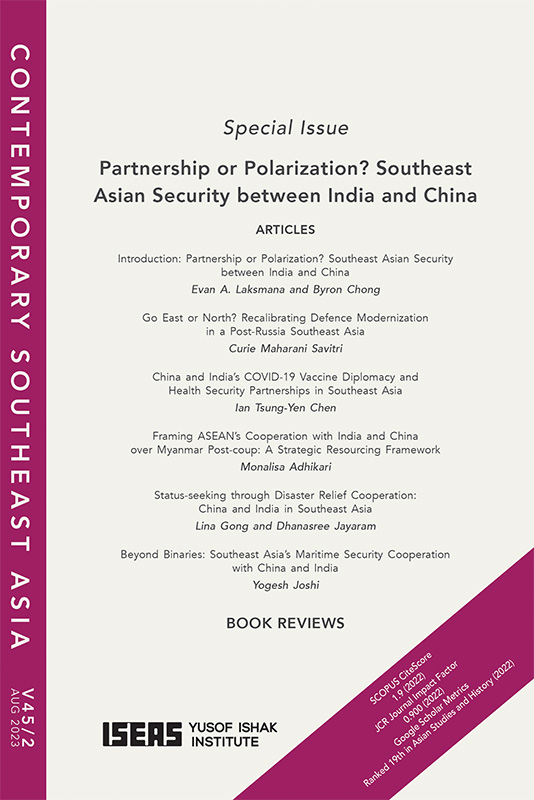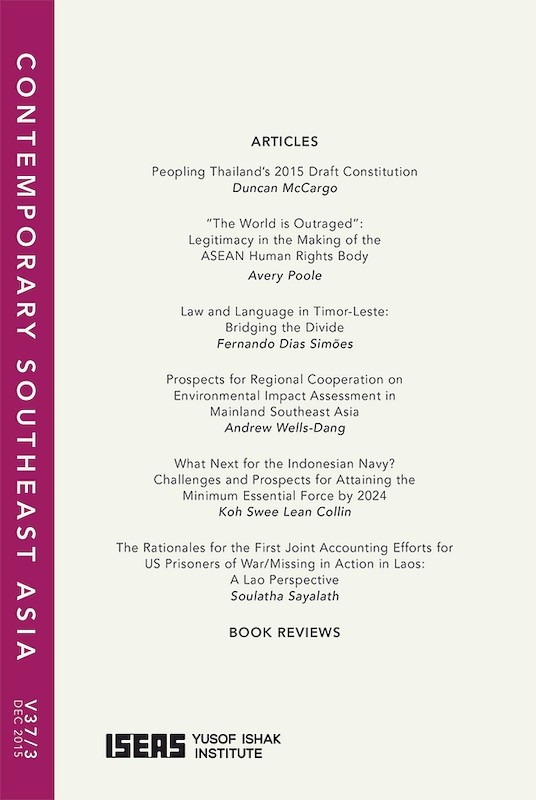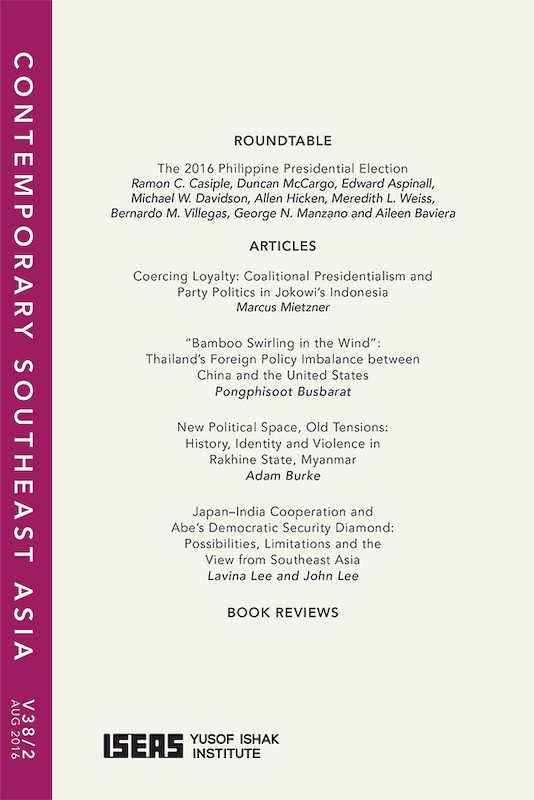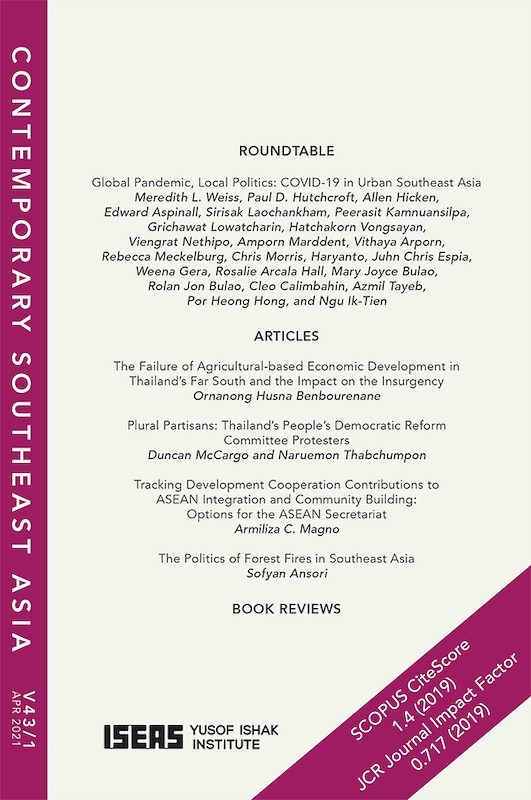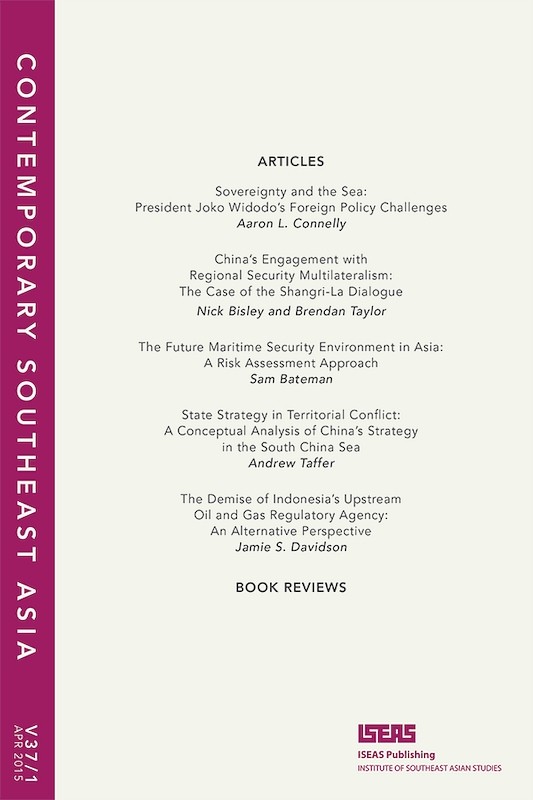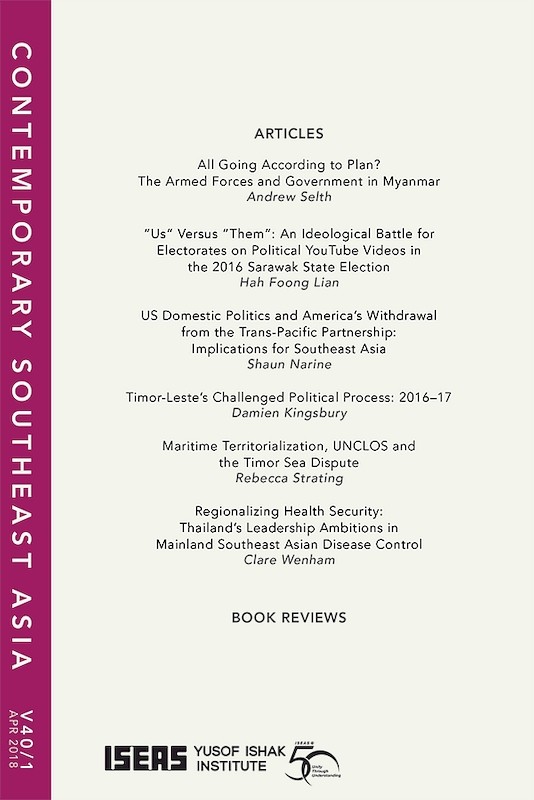Contemporary Southeast Asia Vol. 37/2 (August 2015)
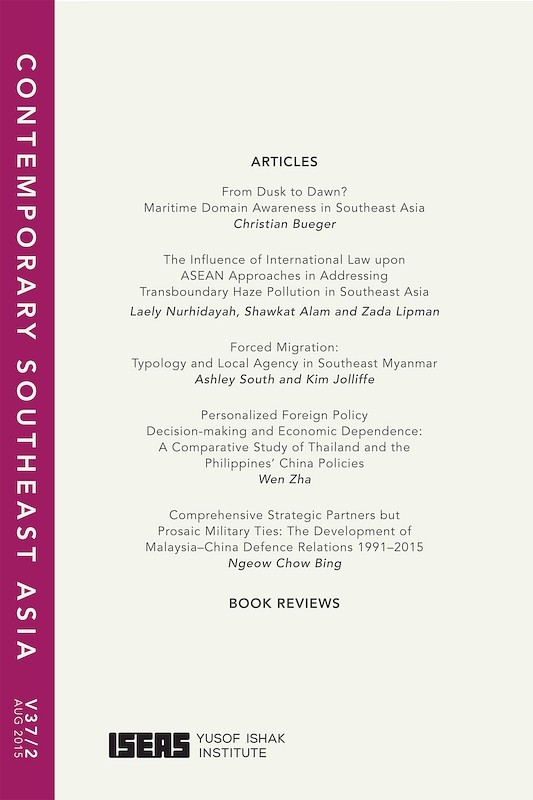
Date of publication:
August 2015
Publisher:
ISEAS – Yusof Ishak Institute
Number of pages:
172
Code:
CS37/2
About the publication
- Attained impact factor of 0.906 in Social Sciences Citation Index 2017
- Ranked 18th by Google Scholar Metrics 2018 in the Asian Studies and History category
Contents
-
Contemporary Southeast Asia Vol. 37/2 (August 2015)
[Whole Publication, ISSN: 1793284X] -
Preliminary pages
- ARTICLES
-
From Dusk to Dawn? Maritime Domain Awareness in Southeast Asia, by Christian Bueger, author see abstractInformation Sharing and Maritime Domain Awareness (MDA) are at the heart of the contemporary maritime security agenda. The goal of MDA is to develop shared understandings of developments and threats at sea. It is one of the preconditions for coordination and cooperation between diverse maritime security agencies and has often been understood as “key enabler”. MDA is a major technical challenge in terms of collecting and fusing data and developing expert systems for the detection of anomalies. It is also a social, political and legal challenge. This study focuses on the latter. It asks how MDA can be organized and how the socio-political challenges can be addressed. The organization of MDA in Southeast Asia is discussed in-depth, with a focus on three major centres that are the backbone of the regional MDA structure. Although far from perfect, this regional system has become a role model for organizing MDA in other parts of the world. This article explores the functions that the three centres perform in the governance of maritime security in the region. I argue that each of the MDA centres has different strengths, and that their work should be seen as complimentary in an overarching system. The strength of the overall system is in enabling trust and being flexible and adaptable to the changing situation at sea. The conclusion outlines what lessons the system holds for the organization of MDA in other regions with a focus on the Western Indian Ocean. <br>
-
The Influence of International Law upon ASEAN Approaches in Addressing Transboundary Haze Pollution in Southeast Asia, by Laely Nurhidayah, Shawkat Alam, Zada Lipman, authors see abstractTransboundary haze pollution from land and forest fires is an annual environmental disaster in Southeast Asia that cannot be resolved without applying both domestic and international legal systems. This article will examine the extent to which international law has influenced ASEAN approaches in addressing transboundary haze pollution. It does so by examining two international legal frameworks. The first is customary international law, namely the state responsibility for transboundary environmental harm principle, and the second is Multilateral Environment Agreements (MEAs) in atmosphere and biodiversity. It discusses how international law frameworks can contribute to solving regional environmental problems, and how fully applying the principles of international law and improving cooperation in ASEAN can strengthen the regional legal framework. Ultimately, the best solution to land/forest fires is to improve collaboration at the local level through capacity-building and customary practices. ASEAN approaches to transboundary haze pollution do not currently address the problem effectively. <br>
-
Forced Migration: Typology and Local Agency in Southeast Myanmar, by Ashley South, Kim Jolliffe, authors see abstractEthnic armed conflict has plagued southeast Myanmar for over sixty-five years, and has been the cause of significant and repeated episodes of forced migration. The dynamics of forced migration have undergone profound changes in the region since 2012, following the signing of bilateral ceasefire agreements between the government and several Ethnic Armed Groups (EAGs). Within this context, this article describes and analyses the decision-making processes and approaches to return, resettlement and rehabilitation of forced migrants — Internally Displaced People (IDPs) and refugees. In relation to academic and policy literatures on local agency and humanitarian protection, we argue that forced migrants in and from Myanmar demonstrate great resilience and significant capacities for self-protection and that external support should be geared towards supporting local coping strategies and attempts to achieve dignified and “durable solutions” to their plight. This approach requires an in-depth exploration of local contexts, and forced migrants’ decision-making processes. We present a typology of conflict-induced forced migrants in and from southeast Myanmar, followed by an analysis of five main factors that influence their decisions, and help to explain some of the key differences between different types.
-
Personalized Foreign Policy Decision-making and Economic Dependence: A Comparative Study of Thailand and the Philippines' China Policies, by Wen Zha, author see abstractThe existing literature on foreign policy formulation suggests that individual leaders in small and politically unstable states exert a disproportionate impact on foreign policy-making. Some analysts further contend that personalized foreign policy decision-making is more likely to suffer from discontinuities. This article, however, argues that the foreign policies of small and politically unstable states exhibit considerable variation in terms of constancy. It does so by offering a comparative study of the foreign policies of the Philippines and Thailand towards China. It demonstrates that the Philippines’ policy towards China underwent significant changes in the last few years of the administration of President Gloria Macapagal Arroyo, and that bilateral relations deteriorated rapidly after Benigno Aquino III came to power in 2010. In contrast, Thailand has maintained a cordial relationship with China despite domestic political turmoil since 2006. This article suggests that neither the shift in the distribution of capabilities nor the presence or absence of territorial disputes sufficiently explains this variation. It argues that the personalization of foreign policy and economic dependence are two important factors that determine constancy and change in the foreign policies of small states towards major powers.
-
Comprehensive Strategic Partners but Prosaic Military Ties: The Development of Malaysia-China Defence Relations 1991-2015, by Ngeow Chow Bing, author see abstractMalaysia and China upgraded their relationship to a Comprehensive Strategic Partnership in 2013 and signed a Joint Communique in 2014. Although the Comprehensive Strategic Partnership includes a pledge to strengthen cooperation between the armed forces of the two countries, so far, however, Sino–Malaysian defence ties have advanced only incrementally. This article focuses on the development of defence relations between the two countries from 1991 until the first half of 2015. It examines several areas of defence diplomacy, including visits by senior officials, the exchange of military students, arms sales, defence and security consultations and combined military exercises. It concludes that although Malaysia–China defence ties have not developed as quickly as other aspects of the bilateral relationship, this does not mean that the Comprehen-sive Strategic Partnership lacks depth, or that Kuala Lumpur fundamentally distrusts Beijing because of recent developments in the South China Sea.
- BOOK REVIEWS
-
BOOK REVIEW: Opposing the Rule of Law: How Myanmar's Courts Make Law and Order. By Nick Cheesman, by Melissa Crouch, author
-
BOOK REVIEW: Changing Security Dynamics in East Asia: A Post-US Regional Order in the Making? Edited by Elena Atanassova-Cornelis and Frans-Paul van der Putten, by Nur'Asyura Salleh, author
-
BOOK REVIEW: Myanmar: The Dynamics of an Evolving Polity. Edited by David Steinberg, by Sean Turnell, author
-
BOOK REVIEW: Incomplete Democracies in the Asia-Pacific: Evidence from Indonesia, Korea, The Philippines, and Thailand. Edited by Giovanna Maria Dora Dore, Jae H. Ku and Karl Jackson, by Punchada Sirivunnabood, author
-
BOOK REVIEW: Winning the Peace: Australia's Campaign to Change the Asia-Pacific. By Andrew Carr, by Craig A Snyder, author
-
BOOK REVIEW: India's Rise as an Asian Power: Nation, Neighbourhood, and Region. By Sandy Gordon, by Dhruva Jaishankar, author

